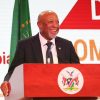Omanyano ovanhu koikundaneki yomalungula kashili paveta, Commisiner Sakaria takunghilile
Veronika Haulenga
Omanyano ovanhu koikundaneki yomalungula kashili paveta, Commisiner Sakaria takunghilile
Veronika Haulenga
Listeners:
Top listeners:
-
play_arrow
Omanyano ovanhu koikundaneki yomalungula kashili paveta, Commisiner Sakaria takunghilile Veronika Haulenga


The National Disability Council of Namibia (NDCN) conducted a consultative workshop in Rundu on Tuesday to discuss the Persons with Disabilities Draft Bill and the National Policy on Disability. NDCN Chief Executive Officer Angelique Philander addressed the workshop, saying the consultations were prompted by an outdated national policy on disability established in 1997. She explained that the policy no longer aligns with the current needs and advancements of people living with disabilities, and that the workshop’s objective is to develop a comprehensive and up-to-date national policy on disability.
“Namibia is taking issues pertaining to persons with disability very seriously because we recognise that persons with disabilities have strategic roles to play in the country’s national development and in the attainment of national development goals as set out in Vision 2030,” she said.
She stressed the necessity of collective efforts to fast-track the implementation and domestication of the United Nations Convention on the Rights of Persons with Disability.
This, she said, will help to break down barriers hindering persons with disabilities from becoming active participants in society. “In existing legislative frameworks, the rights and needs of persons with disabilities are not comprehensively protected, thus the NDCN embarked on this process of developing the Persons with Disability Bill which will repeal the National Disability Council of Namibia’s Act of 2004,” she said.
Kavango East Region Governor Bonny Wakudumo, in a statement read on his behalf, said these consultations aim to not only ensure Namibia’s compliance with international obligations, but also to guarantee necessary protection for persons with disabilities in the country.
(NAMPA)
SH/AS
(NAMPA)
Written by: Contributed
human rights Kavango East Namibia's Act of 2004 National Disability Council of Namibia Persons with Disability United Nations
Similar posts
Ngurare says unnecessary bureaucracy must fall
https://youtu.be/XRX3v5DCD_4 By: Ludorf Iyambo Prime Minister Dr Elijah Ngurare told executive directors that unnecessary bureaucracy must fall, and common sense must prevail within government ministries. Ngurare also says theories are important, but being deliberate, proactive, and practical is more important. Ngurare made the remarks on Thursday during his first meeting with all executive […]
Windhoek Weather
Most popular

Mbumba signs off new benefits for retired political office bearers

Former FNB employee arrested after defraud pensioner off N$215, 000

Namdia Heist: More questions, lots of confusion

Omuhwahwameki Michael okuunganeka oshikonga shoku patitha oostola dho Rani moshilongo ashihe.

Walvis Bay woman loses over N$777.000 to a fraudster
Copyright 2025 Future Media (Pty) Ltd | Website by Digital Platforms
Tel: +264 83 000 1000 | Email: news@futuremedia.com.na




